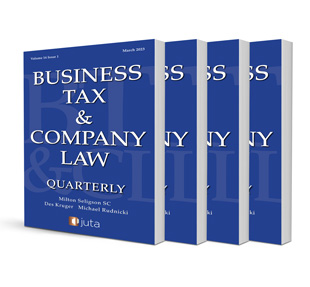
The Misuse and Abuse of Section 80J of the Income Tax Act: Time to get back to the basics
Author: Ed Liptak
ISSN: 2219-1585
Affiliations: Independent Tax Person Extraordinaire
Source: Business Tax & Company Law Quarterly, Volume 14 Issue 1, 2023, p. 1 – 12
Abstract
Section 80J of the Income Tax Act was introduced in 2006 as part of the then new General Anti-Avoidance Rule (GAAR). This section requires the Commissioner to notify a taxpayer at the point in an audit when he/she first comes to believe that the GAAR may be applicable to an arrangement entered into or carried out by the taxpayer. It was enacted in response to concerns that the new GAAR might be automatically relied upon by SARS as a ‘catch-all’ section of last resort without due and proper consideration. Commentators also expressed concerns about conduct of audits under former s 103, particularly with respect to delays they encountered and the time and expensed they incurred. Section 80J attempted to address these concerns by providing a logical framework for the timeous conduct of audits under the new GAAR. Subsection (1) requires the Commissioner to notify the taxpayer if he/she believes the GAAR may be applicable to an arrangement and state his/her reasons therefor; sub-s (2) gives the taxpayer an opportunity to respond to that notice; sub-s (3) requires the Commissioner to take further action within a specific statutory time frame; and sub-s (4) permits the Commissioner to revise or modify his reasons for applying the GAAR in light of any additional information that may come to his knowledge. Two recent judgments have raised concerns about the current approach being taken to s 80J by taxpayers and, to a certain extent, SARS itself. In particular, taxpayers appear to be taking the position that section 80J(1), read together with the statutory definition of ‘arrangement’, have imposed a burden upon the Commissioner to identify and describe a transaction, operation or scheme with an exacting degree of precision never before required under the former s 103 or its predecessors. This approach cannot be support by a textual, contextual and purposive interpretation of the provisions involved, and, in fact, would severely frustrate both the overriding purpose of the current GAAR and the specific purposes of s 80J itself.